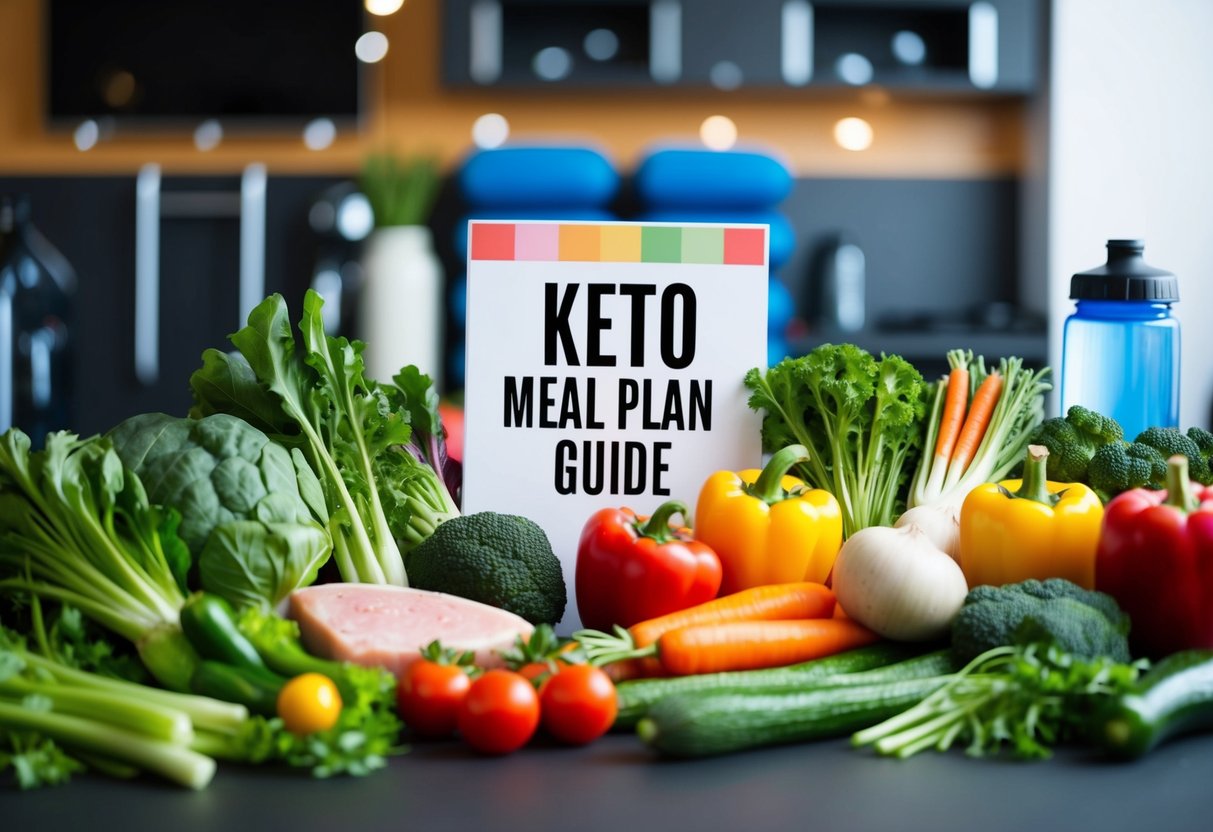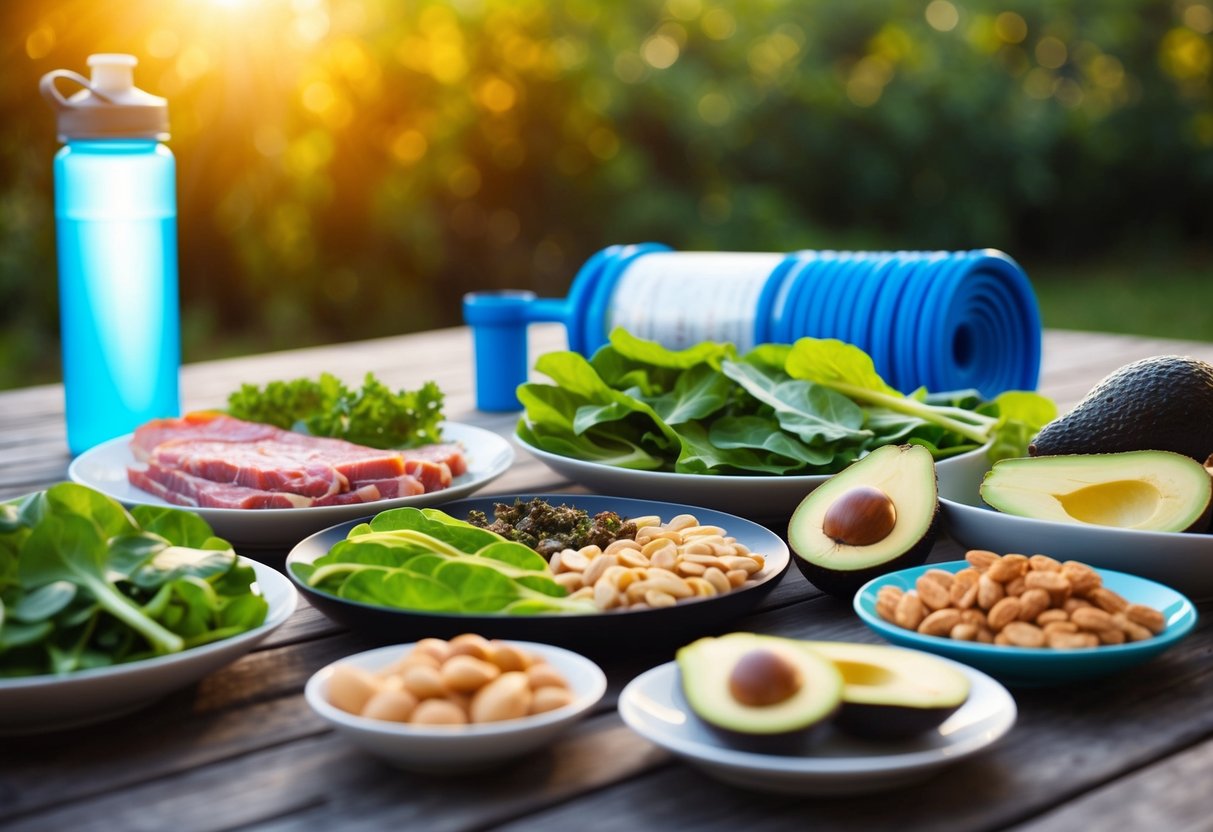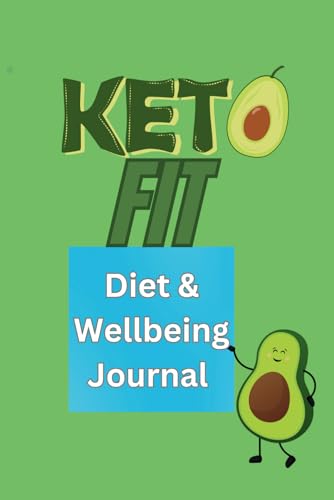Keto Diet for Athletes: Enhancing Performance Naturally
This post may contain affiliate links. If you purchase through these links, I may earn a small commission at no extra cost to you. LEARN MORE.
The keto diet has gained popularity among athletes looking for an edge in performance and body composition. By reducing carbohydrate intake and increasing fat consumption, the body shifts its energy source to fats, a state known as ketosis.

For athletes, the transition to a ketogenic diet requires careful planning to maintain energy levels and muscle mass. This involves adjusting macronutrient ratios to fit an athlete’s specific needs while ensuring sufficient protein intake to support muscle recovery and growth.
The potential benefits of keto diet for athletes can extend beyond endurance, as it may also aid in reducing body fat, improving body composition, and optimizing metabolic health.
Exploring the keto diet’s impact on athletic performance offers insights into how athletes can harness this dietary approach to reach their fitness goals.
Understanding how to implement and customize a keto diet plan can be crucial for maximizing performance while minimizing potential drawbacks.
Key Takeaways
- Keto can improve endurance by using fat as fuel.
- Customizing macronutrients supports muscle and energy.
- Carefully planned keto can aid athletic performance.
Understanding the Keto Diet

The keto diet focuses on modifying dietary habits to encourage the body to enter a state of ketosis. This metabolic state shifts the body’s fuel source from carbohydrates to fats, which can have significant implications for athletes.
Defining Ketosis and Keto Diet Principles
Ketosis is a natural metabolic state where the body burns fat for fuel instead of carbohydrates. This occurs when carbohydrate intake is significantly reduced, leading the liver to convert fat into ketones. These ketones provide energy, especially for organs like the brain.
The keto diet emphasizes a high-fat, moderate-protein, and low-carbohydrate intake.
Typically, the macronutrient ratio consists of about 70-75% fats, 20-25% protein, and 5-10% carbohydrates. This composition encourages the body’s transition to burning fat for energy and helps in maintaining a state of ketosis.
Understanding these principles is crucial for athletes aiming to harness the benefits of fat adaptation.
Keto Diet Variations
Several variations of the keto diet exist, each with unique macronutrient balances catering to different needs.
The Standard Ketogenic Diet (SKD) follows the traditional high-fat, very low-carb formula.
The Cyclical Ketogenic Diet (CKD) involves periods of higher-carb refeeds after several days of low-carb eating, which can support keto adaptation while allowing flexibility for performance enhancement.
Targeted Ketogenic Diet (TKD) involves consuming additional carbs around workouts to provide energy without disrupting ketosis.
Athletes may prefer this to better support intense physical activity.
The High-Protein Ketogenic Diet is similar to SKD but includes more protein, suitable for those focusing on muscle maintenance alongside ketosis.
Adjusting the approach according to individual energy demands and training intensity can maximize the diet’s benefits for athletic performance.
Customizing Your Keto Plan

Athletes can achieve their optimal performance by customizing their keto diet to suit unique fitness goals and nutritional needs. A personalized approach allows for precise adjustments in macronutrient balance and diet duration, maximizing benefits and ensuring sustainability.
Creating a Personalized Keto Diet for Athletes
Creating a personalized keto diet involves adjusting macronutrient ratios to suit individual activity levels and goals. For example, athletes might opt for a higher protein intake to support muscle recovery while maintaining ketosis.
A typical custom keto plan might include 70% fat, 20% protein, and 10% carbohydrates.
Athletes should monitor their body’s response, tweaking the ratios to optimize energy levels and performance.
Consulting with a nutritionist can provide tailored guidance, ensuring that dietary adjustments support both athletic and health objectives effectively.
Keto Diet Length Variation
The length of a keto diet can vary depending on an athlete’s performance goals.
Some might follow a 60-day keto diet plan to adapt fully to ketosis, while others could use shorter stints like a 7-day keto diet plan for quick resets.
An 8-week custom keto diet plan might offer a balance between short-term and long-term sustainability.
Different lengths suit different stages of training and competition cycles.
Athletes should consider factors like competition schedules and recovery periods when deciding the duration.
Regular assessments of physical and mental performance can guide decisions regarding diet duration adjustments.
Nutrition and Meal Planning

Ensuring optimal nutrition for a keto diet for athletes involves selecting the right foods and crafting suitable meal strategies. This approach supports performance and helps maintain energy levels throughout training and competitions.
Keto-Friendly Foods and Alternatives
A keto diet for athletes emphasizes high-fat, moderate-protein, and low-carbohydrate foods.
Foods to include are avocados, nuts, seeds, fatty fish, and oils like olive and coconut.
Proteins can come from meat, poultry, and eggs. It’s vital to choose clean sources to maintain dietary integrity.
Low-carb vegetables, such as spinach, kale, and broccoli, complement the diet for essential nutrients.
Diet sodas can offer a sugar-free beverage option, while limited alcohol intake is recommended, focusing on drinks like dry wine.
Substituting traditional carbs with alternatives like zucchini noodles or cauliflower rice can also keep meals diverse and enjoyable. A comprehensive keto diet food list can aid in planning.
Athlete-Specific Keto Meal Strategies
Athletes require tailored keto meal plans to ensure adequate fuel for performance.
Breakfast options might include fried eggs with sautéed vegetables and bacon, providing a balance of fats and proteins.
For lunch and dinner, meals like grilled salmon with avocado salad or chicken thighs with mushroom cream sauce are excellent choices.
Pre- and post-workout snacks, such as almond butter on celery sticks or protein-rich shakes, support energy needs without disrupting ketosis.
Adopting a clean keto diet meal plan ensures processed foods are minimized, enhancing nutrition quality.
Meal prepping can streamline daily decisions, allowing athletes to focus on training while maintaining diet consistency.
Keto Performance for Athletes

For athletes, the keto diet’s impact on performance involves changes in endurance and strength due to metabolic shifts. It also involves an adaptation period that influences effectiveness during training and competitions.
Impact on Athletic Endurance and Strength
The ketogenic diet leverages fat to supply energy, significantly altering an athlete’s endurance and strength dynamics.
Studies suggest that endurance athletes might experience benefits as their bodies optimize fat utilization, which could support sustained energy release during prolonged activities.
Conversely, athletes focusing on strength may face challenges. The decrease in carbohydrate intake can affect glycogen stores, potentially impacting activities that rely on short bursts of power.
The diet entails a cautious balance; athletes might need to adjust macronutrient ratios depending on their specific sport needs. This adjustment ensures that performance is neither hindered nor excessively compromised, taking into account individual responses.
Keto Adaptation for Training and Competition
Adopting a ketogenic diet leads to significant physiological changes. When transitioning, the body shifts from glucose to fat as its primary energy source.
This adaptation period, which can extend over several weeks, is critical. Some athletes report initial performance declines, yet improvements may occur after full adaptation.
Training regimens may need modifications during this phase. Allowances for diminished short-term power should be considered.
As the body becomes keto-adapted, many athletes testify to increased endurance without compromising performance.
Monitoring and Adjusting Your Diet

Athletes on a ketogenic diet must focus on careful monitoring and strategic adjustments to maintain optimal performance. This involves tracking macronutrient intake and being prepared to modify dietary plans as needed.
Tracking Progress and Nutritional Intake
It’s crucial for athletes to regularly track their nutritional intake and physical progress.
Utilizing tools like a keto diet calculator can help ensure that the right balance of fats, proteins, and carbohydrates is met.
Tracking software or a keto diet plan PDF can assist in consistently monitoring these intakes.
Athletes should pay attention to performance metrics and how they correlate with their dietary choices.
Regular hydration levels, energy output, and recovery times can indicate how well the body is adapting to the diet.
When to Modify Your Keto Diet Plan
Modifications to a keto diet may be necessary when performance levels or health indicators change.
Factors such as weight fluctuations, energy dips, or stalled progress might warrant a review of the diet plan.
It’s beneficial to conduct a custom keto diet review periodically.
Adjusting macronutrient ratios or calorie intake can aid in overcoming plateaus.
Flexibility in dietary planning allows for optimizing performance and health outcomes.
Consulting with a nutritionist can provide insights into making effective adjustments.
Frequently Asked Questions
Athletes exploring the keto diet often have questions about its impact on performance, recovery, and the specific needs of different sports. Addressing common concerns can help determine the suitability and effectiveness of this diet for various athletic disciplines.
What are the potential benefits and drawbacks of the keto diet for endurance athletes?
For endurance athletes, the keto diet may increase fat oxidation, providing a steady energy supply during prolonged activities. This can potentially improve stamina over long distances.
Some athletes might experience reduced performance during the initial transition to ketosis as their bodies adapt to burning fat instead of carbohydrates.
How does the keto diet impact performance in high-intensity sports like sprinting?
In high-intensity activities, where the body relies heavily on quick energy sources like carbohydrates, following a keto diet might pose challenges.
Sprints require rapid energy bursts, and the limited availability of glycogen on a low-carb diet could impact speed and power output during these exercises.
Can following a keto diet enhance muscle recovery and growth in bodybuilding?
The keto diet might aid in muscle recovery due to its potential anti-inflammatory effects.
Bodybuilders may find benefits in maintaining muscle mass while reducing body fat. However, achieving muscle growth can be challenging unless protein intake is carefully managed, as the diet traditionally limits carbohydrate and protein consumption.
Have any Olympic athletes successfully incorporated a keto diet into their training regimen?
Several Olympic athletes have adopted the keto diet, noting enhanced fat oxidation and sustained energy levels.
Each athlete’s response can vary, with some reporting positive effects on endurance and others finding it incompatible with their sport’s energy demands.
What are the best ketogenic fuel sources for endurance sports?
Endurance athletes can benefit from integrating keto-friendly fuel sources such as MCT oil, avocados, and nuts.
These options provide quick sources of fat that can be easily metabolized into energy, helping sustain performance during long workouts.
How does transitioning to a keto diet affect energy levels during athletic training?
During the initial phase of transitioning to a keto diet, athletes may experience fluctuating energy levels, sometimes referred to as the “keto flu.”
However, as their bodies adapt, many report stable energy and reduced hunger, which can facilitate longer training sessions without frequent refueling.










